-
IP addresses are NOT logged in this forum so there's no point asking. Please note that this forum is full of homophobes, racists, lunatics, schizophrenics & absolute nut jobs with a smattering of geniuses, Chinese chauvinists, Moderate Muslims and last but not least a couple of "know-it-alls" constantly sprouting their dubious wisdom. If you believe that content generated by unsavory characters might cause you offense PLEASE LEAVE NOW! Sammyboy Admin and Staff are not responsible for your hurt feelings should you choose to read any of the content here. The OTHER forum is HERE so please stop asking.
You are using an out of date browser. It may not display this or other websites correctly.
You should upgrade or use an alternative browser.
You should upgrade or use an alternative browser.
Ownself check ownself
- Thread starter LITTLEREDDOT
- Start date
Most MPs and the Speaker of Parliament can be privately investigated without prior approval
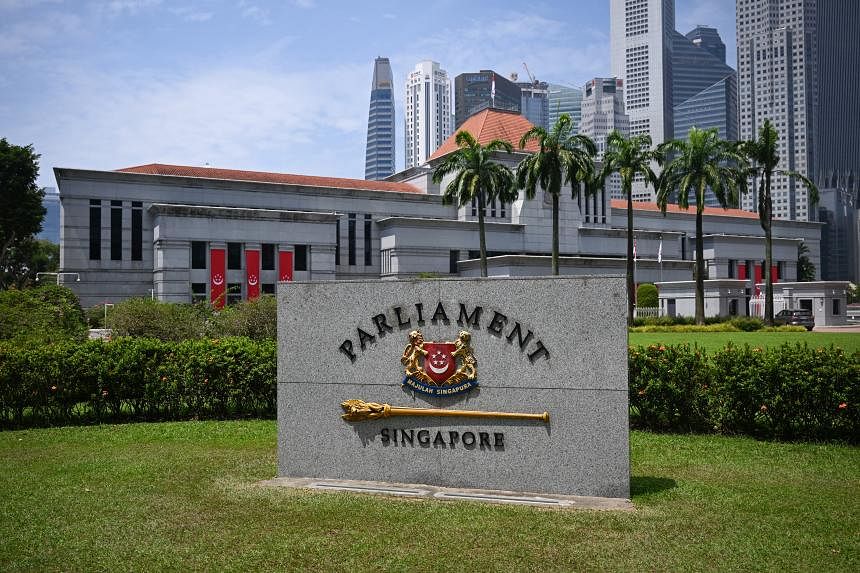
Approval is required for the private investigation of the president, the prime minister, a minister or a minister of state. ST PHOTO: SHINTARO TAY

David Sun
Crime Correspondent
AUG 4, 2023
SINGAPORE - A majority of the MPs and local politicians here can be privately investigated without prior approval from the police, according to the laws regulating the activities of private investigators.
These include the Speaker of Parliament, the leader of the opposition, Nominated MPs (NMPs) and Non-Constituency MPs (NCMPs).
However, approval would be required for the private investigation of the president, the prime minister, a minister or a minister of state.
In response to queries from The Straits Times, the police said that under the Private Security Industry Act, which regulates private investigators, approval is required for “certain security assignments”.
This means private investigators would have to get written approval from the Police Licensing and Regulatory Department before they can investigate certain individuals.
Under the Act, these individuals include a representative here of another government and local political figures.
However, the Act states that “political figures” cover only the president, the prime minister, a minister or a minister of state.
It does not cover the Speaker, leader of the opposition, NMPs or NCMPs. It also does not cover local political figures who are not MPs.
Under the Act, private investigators also require approval before they are engaged by a government of any country other than Singapore.
Private investigators are typically engaged by spouses who want to check on their partners, or companies doing background checks on potential hires.
They are sometimes also hired by potential future in-laws.
A police spokesman told ST that prior approval of certain assignments is required to protect Singapore’s interests.
She said: “This is to prevent persons from conducting investigation activities which may be prejudicial to public interest or national security.”
On Wednesday, NCMP Leong Mun Wai asked in Parliament whether anyone had applied for a permit under the Act to conduct surveillance on former Workers’ Party (WP) MP Leon Perera and party member Nicole Seah.
Mr Perera and Ms Seah resigned from the WP in July after a video exposing their extramarital affair circulated online.
They did not appear to be aware that the video, which shows Mr Perera stroking Ms Seah’s hand several times, was being taken.
Mr Leong also asked if the police would conduct investigations to determine if any laws were broken if there was no such permit applied for.
Home Affairs Minister K. Shanmugam then asked Mr Leong which section of the Act he was referring to.
Mr Leong said that he did not know which section was relevant, but said he was concerned that “any one of us in the public space” could be filmed.
Mr Shanmugam replied that in the case of former MP David Ong, a private investigator was engaged by the husband of the woman Mr Ong was having an affair with.
Mr Ong resigned from his MP position in 2016 over the affair.
Mr Shanmugam added that it did not appear the Act was relevant.
Constitution amended to let president take global roles in private capacity if in national interest
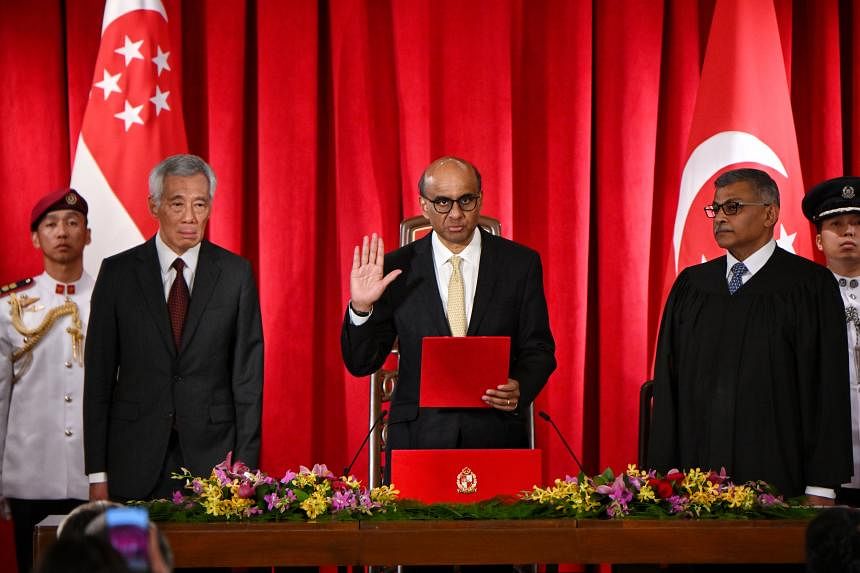
The President is undertaking his national duties when serving in such roles, says Deputy Prime Minister Lawrence Wong. PHOTO: ST FILE

Goh Yan Han
Political Correspondent
NOV 23, 2023
SINGAPORE - Parliament on Nov 22 passed a Bill to create a framework in the Constitution for the president and ministers to take on international appointments in their private capacities, if it is in line with national interests.
Presenting the Bill for debate, Deputy Prime Minister Lawrence Wong said there is value for Singapore’s president to be on some international bodies, but the present arrangement where the Republic’s top diplomat can serve in international appointments only in his official capacity limits him to representing the country’s official position in everything he says.
This would not be in keeping with the requirements of such bodies, which expect their appointees to give their views independent of the governments or organisations they lead, he added in explaining why the Government was amending the Constitution.
There is no legal impediment for ministers to serve in international organisations in their private capacities if they have the prime minister’s approval, DPM Wong noted.
But there is a novel situation when it comes to the president, as the prime minister cannot authorise the president to do likewise, he said. Prior to the latest amendment, the Constitution does not provide for the president, as head of state, to take up public roles where he acts in his private capacity.
“This Bill allows (the president) to express private views but still serve in the national interest, doing duties that are integral and part and parcel of presidential duties,” said DPM Wong.
President Tharman Shanmugaratnam currently holds four international appointments – chairman of the board of trustees of the Group of Thirty; member of the World Economic Forum’s board of trustees; co-chair of the Global Commission on the Economics of Water; and co-chair of the Advisory Board for the United Nations Human Development Report.
These are positions he held when he was senior minister, before he stepped down from Government in July to run for president. He now holds these roles in his official capacity as president, with the advice and support of the Cabinet, and does not receive any remuneration or other benefits from these appointments, said DPM Wong.
DPM Wong said the Cabinet had deliberated over allowing Mr Tharman to continue holding his international appointments in his official capacity after he was elected, as it had been done before. Former president Tony Tan Keng Yam was a member of the honorary senate of the Foundation Lindau Nobel Laureate Meetings while he was in office.
“We might even have given him latitude to express some independent views while contributing to these organisations... AGC (Attorney-General’s Chambers) said this is not expressly prohibited by law, and if we had taken this approach people would be none the wiser,” he said.
But the Government concluded that this would not be ideal for either Singapore or the organisations as the nature and parameters of the President’s involvement would be unclear.
“We would essentially be operating in a new, novel and grey zone,” he said. “And that’s why the Government decided it’s far better to be upfront, transparent and direct about this matter.
“Instead of operating in an area with some ambiguity, we come to Parliament, pass a proper and principled framework, and work within this framework going forward. That’s the proper thing to do.”
DPM Wong also disclosed that, out of an abundance of caution, Mr Tharman has not attended any formal meetings of the four international bodies he has been appointed to since Sept 14, when he was sworn in at the Istana as Singapore’s ninth President.
During the debate, which saw 10 other MPs rise to speak, a recurring question was how the president would juggle his international obligations and his official duties in Singapore.
Ms Denise Phua (Jalan Besar GRC) asked if taking on such roles in his private capacity may divert the president’s attention from his elected responsibilities, while Mr Gerald Giam (Aljunied GRC) said any time spent serving private interests will be time taken away from the president’s national duties and his constituents, who are the people of Singapore.
DPM Wong said that the president serves both Singapore’s domestic and international interests, and that the international dimension is part and parcel of his contribution to Singapore.
He stressed that when the president serves in such a capacity, he is contributing to his national duties.
“Undertaking this role, in a private capacity, does not mean that the President or the minister is somehow doing some ECA - some extracurricular activity - something that’s outside of his work duties,” he said.
There is also confusion between private views and private interest, and allowing the president to serve in his private capacity in such positions serves the national interest, not the president’s private interest, DPM Wong added.
Having accepted that the president’s role covers both the domestic and the international, he acknowledged that questions on bandwidth are legitimate.
In assessing invitations for the president to take on international appointments, the Cabinet will consider the commitments expected by the role, such as the meeting load and travel demands, said DPM Wong.
“This will ensure that the president’s holding of these roles remains to Singapore’s benefit and will not in any way affect his ability to exercise the rest of his constitutional duties,” he said. “The prime minister will likewise do the same for roles involving ministers.”
DPM Wong also answered MPs’ questions on how the Government defines whether such roles are in the national interest.
In general, taking on such a post should be helpful in advancing Singapore’s standing and interest on the international stage, and offer benefits to Singapore as a whole or the government agency overseeing the sector that organisation operates in.
“For example, the president or the minister’s participation could help advance views that are aligned with Singapore’s outlook and approach on issues which help shape the global agenda in areas that are critical to Singapore,” said DPM Wong.
In closing, DPM Wong said Singapore is at a stage of development where national interests are becoming more closely intertwined with global interests, and the Bill will help to strengthen Singapore’s voice in the international stage and add to its participation in influential global forums.
The Bill was passed with Workers’ Party and Progress Singapore Party MPs recording their dissent.
Quote: "SBS Transit said Mr Daniel was appointed based on his independence, qualifications, and working experience..."
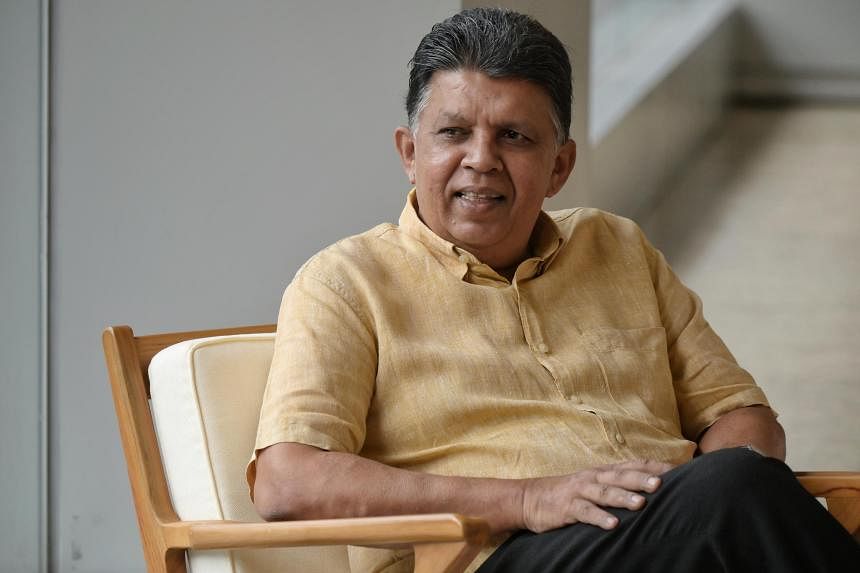
Mr Patrick Daniel will also join SBS Transit as a member of the board’s sustainability and service quality committee. ST PHOTO: KUA CHEE SIONG
Michelle Zhu
DEC 29, 2023
SINGAPORE - SBS Transit named two independent non-executive directors, including SPH Media Trust’s (SMT) former interim chief executive officer Patrick Daniel, to its board with effect from Jan 1, 2024.
SBS Transit said Mr Daniel was appointed based on his independence, qualifications and working experience in a bourse filing on Dec 29. The group said its board believes he will “provide greater balance and diversity of skills, experience, and knowledge” among its directors.
He will also join SBS Transit as a member of the board’s sustainability and service quality committee. Mr Daniel served as SMT’s interim chief executive from 2021 to 2022.
Prior to that, he was a consultant to Singapore Press Holdings (SPH) from 2017 to 2018, and the group’s deputy CEO from 2016 to 2017. From 2007 to 2016, he was editor-in-chief of SPH’s English, Malay and Tamil newspapers.
Mr Daniel’s previous directorships include Sembcorp Marine from April 2018 to March 2023. This was before the company officially changed its name to Seatrium in April 2023.
He remains on the boards of several non-listed companies, including SMT, SPH Foundation and Singapore Press Club.
The other incoming director, Mr Edwin Yeo, is a director of digital technology solutions provider Kainos Innovation as well as logistics company Quantum Storage Singapore. His tenure at the latter company is due to end on Dec 31, 2023.
Over the past 10 years, Mr Yeo has worked at United States-listed companies such as Sun Microsystems, where he was the sales director for Asean. He also held roles related to channels for the Asia-Pacific (Apac) region at Oracle, Symantec and Broadcom. At Quantum Corporation, he was area vice-president for Apac.
SBS Transit said it will arrange for Mr Yeo to attend the relevant modules under the listed entity directors programme, which is organised by the Singapore Institute of Directors, to fulfil mandatory training requirements.
SBS Transit shares were trading up one cent, or 0.4 per cent, at $2.68 as at 2.26pm on Dec 29, after the announcement. THE BUSINESS TIMES
Former SPH Media Trust interim CEO Patrick Daniel appointed to SBS Transit’s board

Mr Patrick Daniel will also join SBS Transit as a member of the board’s sustainability and service quality committee. ST PHOTO: KUA CHEE SIONG
Michelle Zhu
DEC 29, 2023
SINGAPORE - SBS Transit named two independent non-executive directors, including SPH Media Trust’s (SMT) former interim chief executive officer Patrick Daniel, to its board with effect from Jan 1, 2024.
SBS Transit said Mr Daniel was appointed based on his independence, qualifications and working experience in a bourse filing on Dec 29. The group said its board believes he will “provide greater balance and diversity of skills, experience, and knowledge” among its directors.
He will also join SBS Transit as a member of the board’s sustainability and service quality committee. Mr Daniel served as SMT’s interim chief executive from 2021 to 2022.
Prior to that, he was a consultant to Singapore Press Holdings (SPH) from 2017 to 2018, and the group’s deputy CEO from 2016 to 2017. From 2007 to 2016, he was editor-in-chief of SPH’s English, Malay and Tamil newspapers.
Mr Daniel’s previous directorships include Sembcorp Marine from April 2018 to March 2023. This was before the company officially changed its name to Seatrium in April 2023.
He remains on the boards of several non-listed companies, including SMT, SPH Foundation and Singapore Press Club.
The other incoming director, Mr Edwin Yeo, is a director of digital technology solutions provider Kainos Innovation as well as logistics company Quantum Storage Singapore. His tenure at the latter company is due to end on Dec 31, 2023.
Over the past 10 years, Mr Yeo has worked at United States-listed companies such as Sun Microsystems, where he was the sales director for Asean. He also held roles related to channels for the Asia-Pacific (Apac) region at Oracle, Symantec and Broadcom. At Quantum Corporation, he was area vice-president for Apac.
SBS Transit said it will arrange for Mr Yeo to attend the relevant modules under the listed entity directors programme, which is organised by the Singapore Institute of Directors, to fulfil mandatory training requirements.
SBS Transit shares were trading up one cent, or 0.4 per cent, at $2.68 as at 2.26pm on Dec 29, after the announcement. THE BUSINESS TIMES
More select committees won’t necessarily lead to better governance: Indranee
Remote video URL
Tham Yuen-C
Senior Political Correspondent
MAR 07, 2024
SINGAPORE - Setting up parliamentary committees to oversee each ministry will do little to enhance accountability or increase efficiency, and can even eat into the time ministries have for other work, said Leader of the House Indranee Rajah, responding to a proposal by Workers’ Party MPs.
In fact, Singapore’s parliamentary system – where policies and issues are brought to the House through motions or during the Budget debate, and where ad hoc committees are set up to look at specific issues – already allows for good governance, she added.
“What we have is a system that works,” she said, during the debate on Parliament’s spending plans.
“I do not think that having select committees, essentially overseeing or having ministries reporting to them, will improve things.”
Mr Gerald Giam (Aljunied GRC) and Ms He Ting Ru (Sengkang GRC) had proposed setting up more standing select committees, which are appointed for the lifetime of a Parliament.
There are currently seven such committees – the Committee of Privileges, Committee of Selection, Estimates Committee, House Committee, Public Accounts Committee, Public Petitions Committee and Standing Orders Committee.
None of the seven is specific to individual ministries, said Mr Giam, pointing out that this is unlike the practice in other legislatures around the world.
Britain’s House of Commons has select committees for every government department, and Australia’s Parliament has standing committees on health, aged care and employment, among others.
Citing these examples, he said such committees examine each ministry’s policies, spending and administration, and are empowered to look into any matter referred to them by the House or a minister.
They can also call in subject-matter experts to give testimony, and receive special briefings from the government, said Mr Giam.
He called for a similar set-up in Singapore, with committees consisting of MPs from both sides of the aisle set up to oversee each ministry or group of related ministries.
“This process will lead to more informed and constructive debate and better decision-making in Parliament,” he said.
Ms Indranee said Parliament’s current processes already provide a lot of room for the Government and ministers to be held to account.
“A select committee is really a mini version of Parliament as a whole. But here you have everybody that is able to ask questions, participate, debate. So the public does not lose out by this,” she said.
She added that having more of such committees may not be very productive, as they require significant time and effort to set up, and ministries will also have to expend scarce resources reporting to their respective committees.
Instead, what Singapore has done is to convene ad hoc select committees for smaller groups of MPs to study and report to Parliament on specific topics and novel issues of national interest, she said.
An example is the Select Committee on Deliberate Online Falsehoods, set up in 2018 to look at how Singapore can combat misinformation and disinformation.
Citing the committee, Ms Indranee said it had taken 16 meetings over eight months, as well as public consultations with multiple stakeholders and public hearings just to examine the one policy issue alone.
“So you can imagine having many more standing select committees, each one to inspect one ministry that oversees many policy issues, would be very costly in terms of opportunity cost, as well as just the time taken up under civil servants and the ministers and the ministries to do this,” she said.
To this, Mr Giam said that time and resources were also used up when ministries briefed Government Parliamentary Committees (GPCs), which are not Parliament organs, but People’s Action Party (PAP) organs.
Ms Indranee said he had got it “back to front” as the purpose of the GPCs – set up by the PAP to scrutinise the legislation and programmes of the various ministries – is to allow MPs to give feedback to ministries and ministers.
Ministries do not have to brief GPCs or report to them but can choose to do so when they want to seek the input of GPCs, she said.
On other countries with standing select committees for each ministry, Ms Indranee questioned if they necessarily had better outcomes.
“Are they necessarily better governed? Do they necessarily have better outcomes? Are their Parliaments more efficient? Is their government more trusted? I would venture to say no, not necessarily to all of those questions,” she said.
“In fact, on many international rankings by any measure, you will find that Singapore fares well, in governance, transparency, in lack of corruption or in low corruption, and where it is discovered, it is dealt with promptly, quickly and decisively.”
Speaker of Parliament Seah Kian Peng, in his customary closing speech, said more was not necessarily better, whether it was of committees or parliamentary questions.
He quipped: “Indeed, from my perspective, crisper and sharper speeches are much preferred and the order for the day.
“When speeches go on for too long, some of us may start to wonder whether they were written by ChatGPT.”
He added that he was glad there was no need for him to cut anyone off during the debate, though there were quite a few who breached their time allocations and those who attempted to slip in a speech during clarification time.
In the spirit of give and take, he had cut them some slack, he said, adding that he would be more strict in future.
Public service leaders must have courage to advise ministers even when they disagree: SM Teo
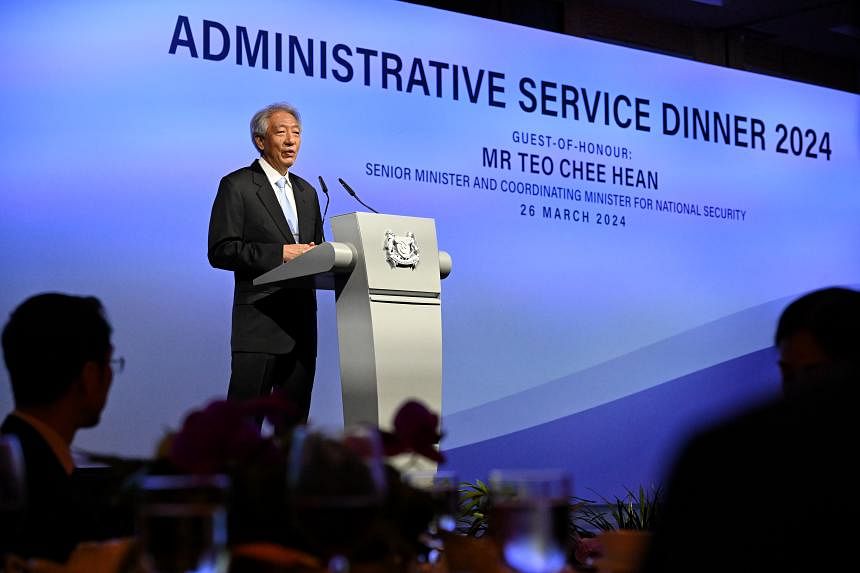
Senior Minister Teo Chee Hean called on the public service leadership to continue its strong partnership with the 4G leaders. ST PHOTO: KUA CHEE SIONG

Jean Iau
Correspondent
MAR 28, 2024
SINGAPORE – Having the courage to speak up even when they disagree with their ministers is an integral principle that civil servants must have if the Singapore system is to keep working, said Senior Minister Teo Chee Hean.
On their part, political leaders must have the courage to make and stand by decisions that are in the best interest of Singapore and Singaporeans, he added.
“Particularly when painful or unpopular, (political leaders must) make the case for them and bring the electorate along,” Mr Teo said in his speech at the annual Administrative Service dinner on March 26.
He recounted a scene in the British political satire sitcom Yes, Minister, where fictitious permanent secretary Humphrey Appleby explains to a younger colleague that telling a minister a decision is “controversial” meant it might lose him votes, while calling it “courageous” meant it might lose him the election.
While the dialogue was tongue-in-cheek, Mr Teo said it exposes a truth: that many polities are now increasingly susceptible to “short-term, politically expedient, populist policies” made to secure votes.
“We are, thankfully, not in an episode of Yes, Minister. In government – in Cabinet and in our ministries – we need to continue to have debate and a diversity of views in a professional manner, but without fear or favour,” Mr Teo told 320 high-potential and senior public service officers.
He cited how, as a young political officeholder, he benefited from the wise counsel of many senior public service leaders. They included Mr Ngiam Tong Dow in the Ministry of Finance, Mr Tan Gee Paw in the then Ministry of the Environment, and later Mr Wee Heng Tin in the Education Ministry, and Mr Lim Siong Guan, when he headed the Civil Service.
“They spoke and acted with integrity and courage, and I have great respect for them,” said Mr Teo. He said he reminds himself these days to listen and learn from younger officers so that they are encouraged to share their considered views and to justify them.
Making a similar call, Singapore Civil Service head Leo Yip urged public service leaders to provide honest advice to political leaders.
Besides speaking truth to power, civil servants need also to “bring power to truth”, which is to convince ministers through the conviction behind their ideas and advice, Mr Yip said in his speech.
“It must be the conviction in your advice, as much as the persuasiveness of your argument, that helps our decision makers to discern the right choices,” he said at the event at the Sands Expo and Convention Centre.
The dinner was also an appointment and promotion ceremony of the Administrative Service. This year, 25 administrative officers were appointed and 62 were promoted.
Once the time for debate is over, civil servants must then implement with conviction the political decisions and policy choices made by the ministers, Mr Yip added. “We can have this conviction because we work so closely with our ministers and understand the reasons for those policy choices.”
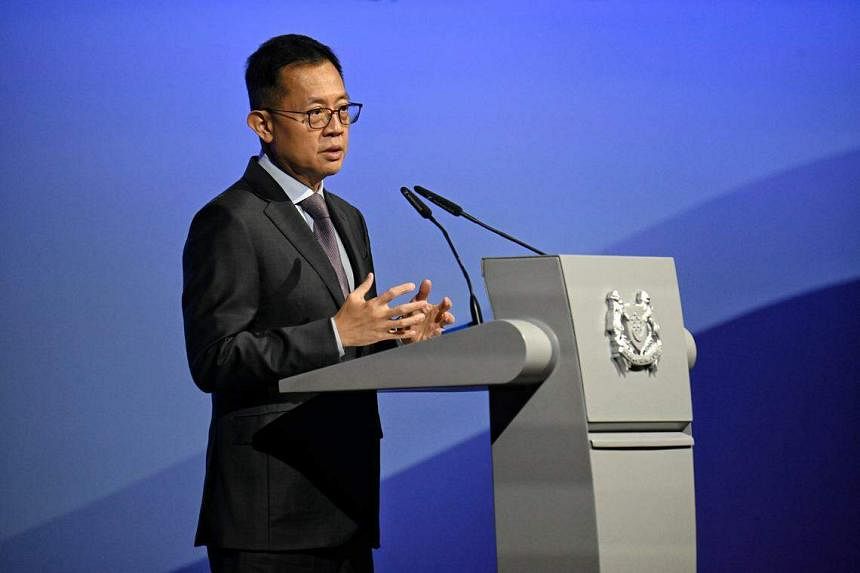
Singapore Civil Service head Leo Yip urged public service leaders to provide honest advice to political leaders. ST PHOTO: KUA CHEE SIONG
In his speech, Mr Teo listed four other Cs besides courage that have ensured a fundamental alignment between generations of the Republic’s political and public service leaders, even when there were differing views on specific policies or their implementation.
These are: Working to keep the world connected and open; using creativity to tackle Singapore’s challenges; unceasing effort to ensure the country stays cohesive; and creating continuity of leadership in Government.
Hewing to these principles will build a strong partnership between the new generation of political and public service leaders that ensures that Singapore remains united in mission, and can successfully navigate an operating environment marked by disconnect, disruption and division, said Mr Teo.
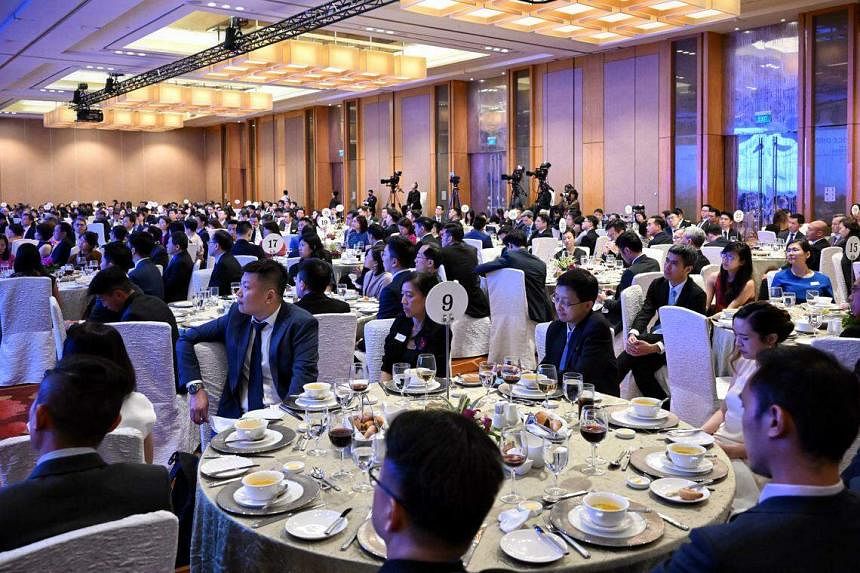
Guests at the annual Administrative Service dinner held at the Marina Bay Sands Expo and Convention Centre on March 26. ST PHOTO: KUA CHEE SIONG
He said Singapore had successfully handed over the reins of responsibility across three generations of political leadership while maintaining the vision, drive and integrity that provide the quality of governance that has helped it to survive and thrive. While he has every confidence in the next transition, having worked with the fourth-generation (4G) leaders for many years, he said others will seek to test the new leadership.
“(They would want to) see if we are united, to see whether we continue to have the strength and mettle to defend and further Singapore’s interests, and whether we will continue to be a steadfast and reliable partner,” he said.
He called on the public service leadership to continue its strong partnership with the 4G. “All of you in this room have a part to play in ensuring that we continue to have a capable, competent and committed government, so that we can continue to have a strong and united Singapore for the benefit of Singaporeans,” said Mr Teo.
Has he donated half his increased salary?
Similar threads
- Replies
- 114
- Views
- 5K
- Replies
- 0
- Views
- 415
- Replies
- 77
- Views
- 5K
- Replies
- 13
- Views
- 483
